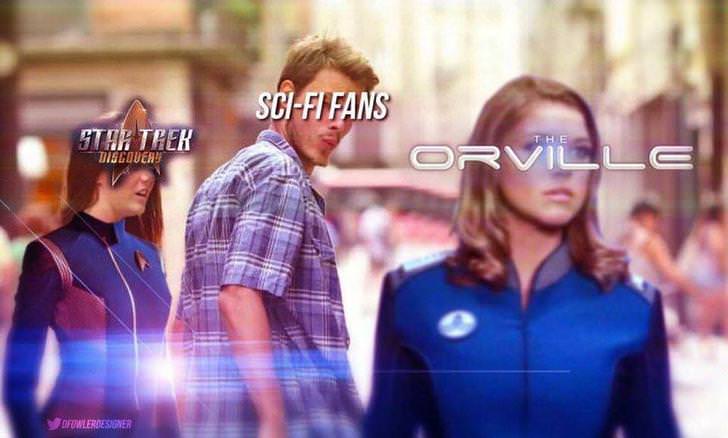this post was submitted on 10 Nov 2023
200 points (94.6% liked)
Risa
6911 readers
11 users here now
Star Trek memes and shitposts
Come on'n get your jamaharon on! There are no real rules—just don't break the weather control network.
founded 1 year ago
MODERATORS
you are viewing a single comment's thread
view the rest of the comments
view the rest of the comments

I know I might be about to ruffle some feathers, but The Orville is how you do representation right imo. The whole story arc with Topa was beautiful.
Like, something that turned me off of nu-trek was how the representation was handled. It felt pandery to an almost gross extent. Like, Jesus Christ man, it's the year 24-something-something, why are you still acting like being gay is a big deal? OoOoOoOoo oh nooooo, there's gay people WoooOoOooo. And while I don't remember there being spoken pandering in the few episodes I watched, there was something about how the scenes were constructed, the shots were lined up, etc, that felt like they were trying to draw attention to the LGBT members doing LGBT things. Again, it's 24XX, I'm supposed to believe humanity has achieved near-utopia, why am I getting the feeling that you're trying to show me how gay these dudes are purely because they're gay. You don't need to do that. It's 24XX, who the hell is still getting bent out of shape about homosexuality 400 years from now?
The Orville, on the other hand, just kinda... treated it like it was normal. Some characters are gay, some characters are straight, but the show didn't really focus on it; some guys just liked other guys more than gals and vice versa. They treated it like it was normal.
Okay, okay, but I brought up Topa, and Topa's story arc is literally all about Topa's gender problems. How does that not go against my previous complaints? Well, Topa isn't human. Topa is from a male-dominated culture that believes femininity is weakness and should be eradicated via gender reassignment. It's not a human culture, and so it doesn't clash with the idea of humanity having a near-utopia. A human utopia involves everyone being treated equally, so when you imply different treatment, whether through dialog choices or cinematography, it clashes with that idea. But the Moclans don't have a utopia, and so putting emphasis on Topa being female makes sense, especially when it comes to the human crew struggling with the clashing ideas of Moclan forced gender reassignment and the human take on sapient rights. Unlike nu-trek, there's no dissonance there.
What? When did DIS ever do that? The fact Stamets and Culber are gay is not central to their character or any episodes. They're just normal people who do normal things who is accepted by everyone around them without question. I'm not sure how much normal you can get than that. I think your issue is that they exist because DIS doesn't do anything you claim with Stamets and Culber.
No, it doesn't at all. Topa has zero character development beyond being transgender. The Orville only brings her out when they want to make an episode about her being discriminated against. She has zero character development outside that. That isn't normal.
It does contradict your other complaint. Your praising the show that does exactly what you said you don't want, and complaining about the show that does exactly what you supposedly want to see. Relegating LGBTQ issues to alien allegories is erasure.
Which DIS does. Stamets and Culber are treated normally.
DIS doesn't do this. There's no hidden subtext which suggests they're different. Not once are they ever discriminated against, even by the evil empress from the racist universe. I'm literally baffled how you think otherwise. I think your own phobias are making you see something that isn't there.
DIS literally kept the relationship low-key unmentioned and made The Kiss reveal a thing.
Orville just had Bortus exist with his husband from ep 1
In fairness, Adira does have a weird moment where they seem reticent about switching pronouns. But I'll defend Disco's representation because I think it's just written with a different lens of how to treat queerness. The themes feel more modern, and more willing to explore what queerness is rather than treating it as something to be tolerated.
I'll never forget my first watchthrough of Season 3 where Stamets refers to Adira as his child. I was floored because I'd mentally joked that Staments shoulda adopted them by now, but here the narrative was coming out and saying it. The writers dove deeper into themes like found family rather than retreading old ground. It's heavy-handed at times, but it feels like queerness written for queer people.